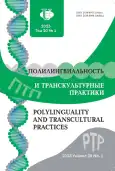Slavic-Turkic Comparisons in the Diachronic Aspect
- Authors: Dmitryuk N.V.1, Arynbayeva R.A.1, Makhanova Z.K.1
-
Affiliations:
- South Kazakhstan State Pedagogical University
- Issue: Vol 20, No 1 (2023)
- Pages: 110-123
- Section: Languages in contact
- URL: https://journal-vniispk.ru/2618-897X/article/view/326719
- DOI: https://doi.org/10.22363/2618-897X-2023-20-1-110-123
- EDN: https://elibrary.ru/VNUYGX
- ID: 326719
Cite item
Full Text
Abstract
The article is devoted to a comparative study of the concept man in the linguistic consciousness of the Eastern Slavs (Russians, Ukrainians) and representatives of the Turkic culture (Kazakhs, Kyrgyz) in a diachronic aspect. The globalization processes of the beginning of the 21st century mark the era of “civilizational breakdown” which is characterized by a change in the usual foundations of life and by obvious transformations of society. Thus, it seems relevant and prognostically valuable to reveal the content of the conceptosphere man in the linguistic consciousness of the ethnic groups under consideration in different periods of their life. The aim of the study is to determine the vector of displacement (or stability) of the axiological component in the choice of assessments and worldview ideas about a man among the informants of different generations. As research material, there were used associative dictionaries compiled on the basis of associative experiments conducted in different periods (Soviet and modern). The associative lexicographic material is recognized as one of the most reliable ways to access a person’s linguistic consciousness, the latter being understood by us as knowledge about the world “externalized” by linguistic signs, and its projections in the mental apparatus of a person, i.e., images of consciousness. This associative method of language consciousness research makes it possible to explain the facts of functioning and transformation of consciousness revealed in psycholinguistic experiments through the connection of these facts with ethnocultural peculiarities of ideas about the world of people as members of certain ethnosocial groups, with their general / universal (basic), and ethnospecific (local) cultural values. The comparative analysis undertaken in the research showed that the process of global civilizational shifts brings afore the interest and desire of the ethnocultural community to search for traditional ethnocultural values that (along with basic universal human values) can unite and strengthen the vitality of the ethnos. The work is being carried out with the prospect of further studies of the linguistic consciousness of ethnic groups, of determining the elements of (in)stability, and identifying conflict zones in the linguistic and conceptual picture of the world of Slavic and Turkic ethnic groups.
About the authors
Natalya V. Dmitryuk
South Kazakhstan State Pedagogical University
Author for correspondence.
Email: nvdmitr@yandex.ru
ORCID iD: 0000-0002-8527-0338
Doctor of Philological sciences, professor, Department of Russian Language and Literature
13, Baitursynova str., Shymkent, 160012, Republic of KazakhstanRimma A. Arynbayeva
South Kazakhstan State Pedagogical University
Email: rimma10.69@mail.ru
ORCID iD: 0000-0002-9181-539X
Doctoral student of the Department of Russian Language and Literature
13, Baitursynova str., Shymkent, 160012, Republic of KazakhstanZhanna K. Makhanova
South Kazakhstan State Pedagogical University
Email: zhanna_kudaibergenovna@mail.ru
ORCID iD: 0000-0001-6992-1834
Doctoral student of the Department of Russian Language and Literature
13, Baitursynova str., Shymkent, 160012, Republic of KazakhstanReferences
- Bakhtikireeva, U.M. 2020. Plenary session of the VI International Scientific and Practical Conference “Bi-, Poly-, translingualism and linguistic education”. Moscow, RUDN. (In Russ.).
- Ufimtseva, N.V., & Balyasnikova, O.V. 2019. Linguistic worldview and associative lexicography. Bulletin of the Volgograd State University. Series 2. Linguistics. 1 (18), pp. 6–22. DOI: https://doi.org/10.15688/jvolsu2.2019.1.1 (In Russ.).
- Leontiev, A.A. 1977. Dictionary of associative norms of the Russian language. Moscow: MSU, 192 p. (In Russ.).
- Butenko, N.P. 1979. Dictionary of asociative norms of Ukrainian language. Lviv, 120 p. (In Ukr)
- Dmitryuk, N.V. 1978. Kazakh-Russian associative dictionary. Shymkent, 246 p. http://dmitryuk-nv.livejournal.com (In Russ / In Kazakh)
- Titova, L.N. 1975. Kyrgyz-Russian associative dictionary. Frunze: Mektep, 96 p. (In Russ / In Kyrgyz).
- Ufimtseva, N.V., Cherkasova, G.A. 2018. Russian regional associative dictionary (European part of Russia — EVRAS). In 2 vols. From stimulus to reaction. T.I Moscow: MMA, 544 p. From reaction to stimulus. T.II Moscow: MMA. 688 p. (In Russ.).
- Ufimtseva, N.V., Cherkasova, G.A., Karaulov, Yu.N., Tarasov, E.F. 2004. Slavic associative dictionary: Russian, Belarusian, Bulgarian, Ukrainian. M., 800 p. (In Russ / In Ukr)
- Dmitryuk, N.V., Moldalieva, D.A., & Abramova, G.I. et al. 2014. Kazaksha associationalyk sozdik / Kazakh associative dictionary. Almaty-Moscow: Media LogoS, 330 p. (In Russ / In Kazakh)
- Balyasnikova, O.V., Dmitryuk, N.V., Ufimtseva, N.V. 2020. Potentially conflictogenic zones in bilingual language consciousness. Materials of the VI MNPC “Bi-, poly-, translingualism and linguistic education. “Philological sciences. Scientific reports of the higher school”, No. 6 (Part 2). Moscow: RUDN, pp. 163–170. DOI: https://doi.org/10.20339/PhS.6-20.163 (In Russ.).
- Zhanuzakov, T. 2008. Kazakh tilinin tusindirme sozdigi. Almaty: DaikPress, 968 p. (In KazaKh)
Supplementary files









